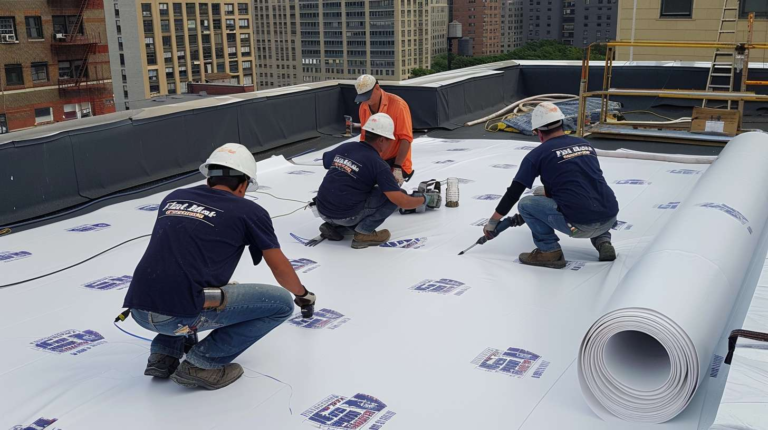Professional Flat Roof Reroofing Services You Can Trust
Look, after twenty-three years of flat roof reroofing across Queens, I've seen every mistake in the book. Last month alone, we fixed three botched reroof jobs in Elmhurst where contractors cut corners. Here's what you need to know about reroofing flat roofs the right way.
When Your Flat Roof Needs Complete Reroofing
Most property owners call us when they notice water stains on their ceiling, but by then the damage is already extensive. A proper flat roof reroofing assessment looks at membrane condition, substrate integrity, and drainage patterns. We examine the entire system because replacing just the surface membrane over compromised decking is like putting a bandage on a broken bone.
The telltale signs are obvious once you know what to look for.
Ponding water that sits for more than 48 hours after rainfall, multiple patch repairs that keep failing, membrane shrinkage creating gaps at seams, and that distinctive musty smell in your building's upper floors. I can't tell you how many times we've opened up a seemingly minor leak to find rotted decking underneath - especially in older buildings in Astoria and Long Island City where the original construction from the 1960s used minimal insulation.
How to Reroof a Flat Roof: The Professional Process
Every legitimate reroof flat roof project starts with a complete tear-off inspection. We strip everything down to the structural deck, which gives us a clear picture of what we're working with. This isn't optional - it's essential for any warranty-backed installation.
The substrate preparation takes longer than most property owners expect. We're talking about slope corrections, deck repairs, vapor barrier installation, and insulation replacement. On a 2,000 square foot commercial building in Flushing last year, we discovered that poor drainage had compromised half the roof deck. The owner initially balked at the additional cost, but six months later during Hurricane Ian, his building stayed completely dry while his neighbor's hastily patched roof failed catastrophically.
Membrane selection depends on your specific situation. EPDM rubber remains popular for its longevity, but TPO offers better energy efficiency if you're dealing with high cooling costs. Modified bitumen works well for buildings with foot traffic, while built-up roofing systems excel in heavy industrial applications.
Flat Roof Garage Reroofing Considerations
Residential garages present unique challenges that most contractors overlook. The flat roof reroofing process for garages requires careful attention to ventilation and moisture control since these structures often lack proper vapor barriers.
We typically recommend a single-membrane system for garage applications - EPDM or TPO - installed over rigid insulation and a proper air barrier. The key is creating positive drainage toward the edges without compromising the structural integrity of the roof deck. On detached garages in Bayside and Whitestone, we often install small cricket systems to direct water away from the foundation walls.
Material Selection and Installation Methods
EPDM rubber membranes last 25-30 years when properly installed, but the adhesive quality makes all the difference. We use Carlisle systems exclusively because their adhesive chemistry works reliably in Queens' climate conditions. The salt air from LaGuardia Airport and the East River accelerates membrane degradation, so we specify thicker gauge materials than standard specifications require.
TPO installation requires precision seaming - those heat welds must be perfect or you'll have problems within five years. Our crew chief Miguel has been seaming TPO for fifteen years, and he still checks every weld with an electronic scanner. That attention to detail is why our TPO installations consistently pass third-party inspections.
Modified bitumen systems work exceptionally well on buildings with rooftop equipment. The puncture resistance handles HVAC maintenance traffic, and the granulated surface provides UV protection. We typically install these systems with a base sheet, intermediate sheet, and cap sheet configuration for maximum durability.
Drainage and Slope Corrections
Here's something most contractors won't tell you: slope correction often costs more than the membrane installation itself. But without proper drainage, your new roof will fail prematurely. Period.
We use tapered insulation systems to create positive drainage toward roof drains and scuppers. The minimum slope should be 1/4 inch per foot, but we typically aim for 1/2 inch per foot when structurally feasible. On a recent project in Jackson Heights, we installed a complex drainage system with three primary drains and four overflow drains to handle the area's intense summer thunderstorms.
Quality Control and Warranty Protection
Every flat roof reroofing project gets documented with digital photos at each installation phase. We photograph the substrate condition, insulation placement, membrane positioning, and all seam locations before covering them with ballast or protective systems.
Our installation crews carry electronic leak detection equipment to test membrane integrity before project completion. This isn't standard practice in the industry, but it prevents callbacks and warranty claims. We've caught dozens of minor installation defects this way - defects that would have caused major problems two or three years down the road.
Flat Masters NY warranties our flat roof reroofing installations for 20 years on materials and 10 years on workmanship. But here's the thing: the warranty is only as good as the installation quality and the company standing behind it. We've been serving Queens property owners since 2001, and we plan to be here for the next twenty years.
Cost Considerations and Project Timeline
Flat roof reroofing typically costs between $8-15 per square foot for complete tear-off and replacement, depending on membrane type and substrate conditions. That's a wide range, but there's no way to provide accurate pricing without a thorough inspection.
The timeline varies significantly based on building size and weather conditions. A typical 1,500 square foot commercial building takes 3-5 days for complete reroofing, assuming cooperative weather. Larger buildings or complex drainage modifications can extend the timeline to several weeks.
Don't let anyone pressure you into emergency reroofing decisions. Yes, leaks need immediate attention, but proper planning prevents costly mistakes. We've salvaged dozens of projects where property owners made hasty decisions and ended up with substandard installations.
Why Choose Flat Masters NY
We're not the cheapest flat roof reroofing contractor in Queens, but we're definitely the most thorough. Our crews average twelve years of experience, and every foreman holds current safety certifications. We maintain full licensing and insurance coverage, including pollution liability insurance for environmental compliance.
Call us at (917) 994-7618 for a comprehensive inspection and detailed proposal. We'll explain exactly what your roof needs and why, with no sales pressure or inflated pricing. After two decades in this business, our reputation speaks for itself.


